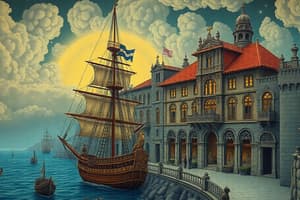Podcast
Questions and Answers
Match the following economic factors of the 17th century with their descriptions:
Match the following economic factors of the 17th century with their descriptions:
Overuse of agricultural lands = Led to reduced farmland productivity Climate change = Caused drastic temperature drops Wars = Contributed to the economic downturn Plague epidemics = Affected population and economic stability
Match the following European powers with their primary economic policies in the 17th century:
Match the following European powers with their primary economic policies in the 17th century:
Netherlands = Exerted significant influence in global trade Great Britain = Focused on controlling overseas colonies Spain = Engaged in mercantilism France = Participated in maritime conflicts
Match the following events with their impacts in the 17th century:
Match the following events with their impacts in the 17th century:
Agricultural land depletion = Resulted in economic crisis Wars among nations = Fought primarily for maritime control Temperature drops = Worsened economic conditions Increase in plague epidemics = Led to further population decline
Match the following terms with their relevant concepts from the 17th century:
Match the following terms with their relevant concepts from the 17th century:
Match the following time periods with the events that characterized them:
Match the following time periods with the events that characterized them:
Match the following causes of the economic crisis of the 17th century with their descriptions:
Match the following causes of the economic crisis of the 17th century with their descriptions:
Match the following impacts of the economic crisis of the 17th century with their outcomes:
Match the following impacts of the economic crisis of the 17th century with their outcomes:
Match the following countries with their actions in global trade during the 17th century:
Match the following countries with their actions in global trade during the 17th century:
Match the following characteristics of mercantilism with their definitions:
Match the following characteristics of mercantilism with their definitions:
Match the following European powers with their respective strategies in global trade:
Match the following European powers with their respective strategies in global trade:
Flashcards
17th-century economic crisis cause
17th-century economic crisis cause
Excessive land use, wars, climate changes, and plagues caused a major economic crisis during the 17th century.
Crisis impact on agriculture
Crisis impact on agriculture
The 17th-century crisis led to less food production.
Mercantilism definition
Mercantilism definition
A 17th-century economic policy where European powers sought to control trade and establish colonies.
Holland/England's rise in trade
Holland/England's rise in trade
Signup and view all the flashcards
Colonial exploitation effect
Colonial exploitation effect
Signup and view all the flashcards
17th Century European Economic Crisis
17th Century European Economic Crisis
Signup and view all the flashcards
Agricultural Land Depletion
Agricultural Land Depletion
Signup and view all the flashcards
Mercantilism
Mercantilism
Signup and view all the flashcards
Dutch and English Expansion
Dutch and English Expansion
Signup and view all the flashcards
17th-Century European Wars
17th-Century European Wars
Signup and view all the flashcards




